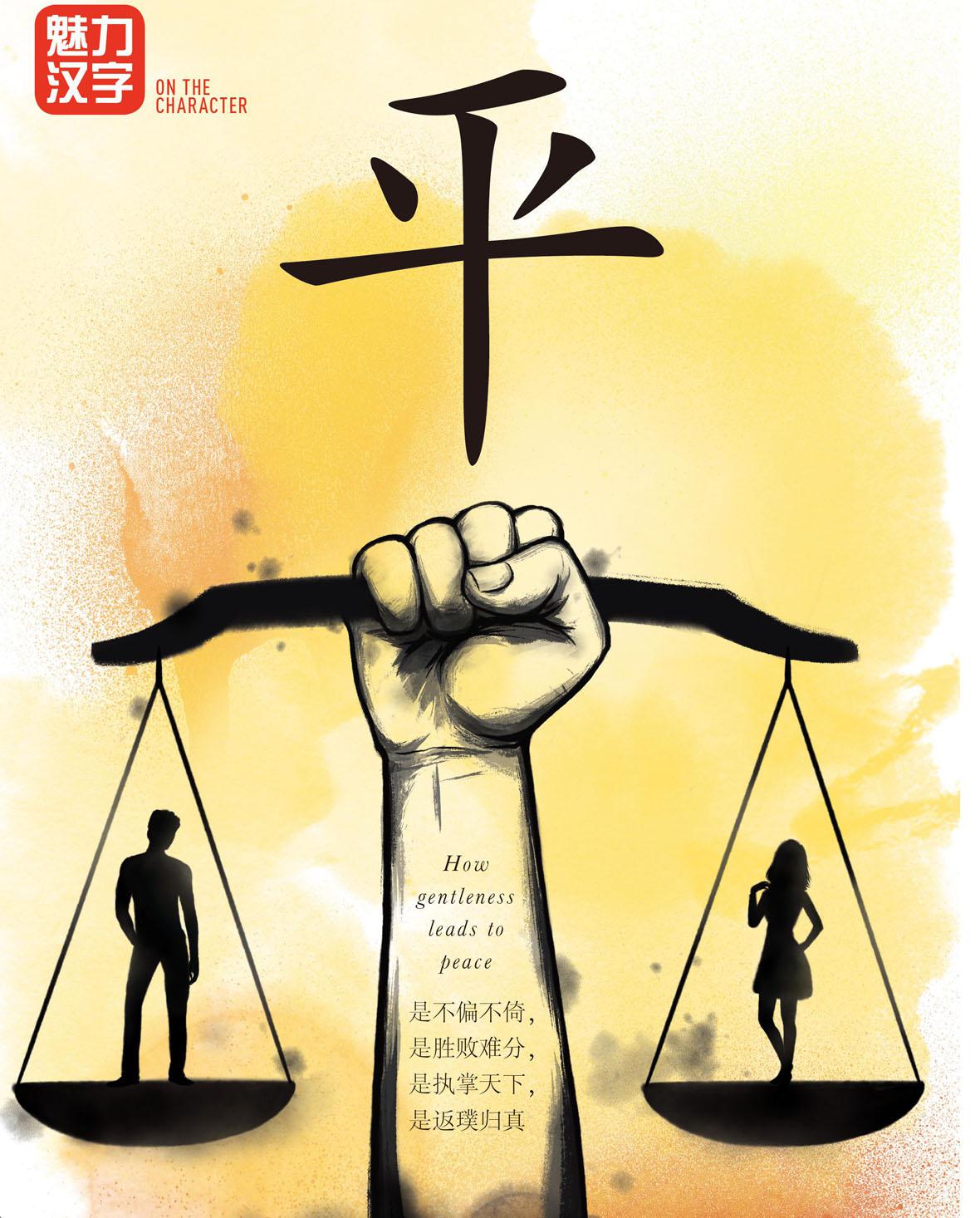ON THE CHARACTER 平
孙佳慧 黄伟嘉


How gentleness leads to peace
是不偏不倚,是胜败难分,是执掌天下,是返璞归真
It is my spirit that addresses your spirit; just as if both had passed through the grave and we stood at Gods feet, equal—as we are!” This declaration from Jane Eyre can still stir the heart. The key to building a civilized world is equality, a society without bias or discrimination. For that, we have 平 (p!ng).
平 has existed in Chinese for more than 2,000 years, originally used to describe a calm, flat, gentle tone. Over the years, 平 has taken on an array of meanings, but they all seem to point back to that original sense of serenity. The character is often associated with “stable” and “peaceful”. To depict a mood or environment of peace, quiet, and tranquility, one might use 平靜 (p!ngj#ng); to describe words and deeds, we say 平和 (p!ngh9, gentle, mild, and moderate). Peace in general can be described with 和平 (h9p!ng). By adding a negative, you get things like 不平 (b&p!ng), meaning “resentful and indignant”.
Before you begin a long journey, you might hear the phrase 报平安 (b3o p!ng`n), loosely meaning, “tell others youre safe”. Eighth century poet Cen Shen (岑参) was on a long journey and one day came across a friend from his hometown who was on his way back home. Without a pen and paper, he recited a poem instead, saying: “马上相逢无纸笔,凭君传语报平安。 (M2 shang xi`ngf9ng w% zh@ b@, p!ng j$n chu1n y^ b3o p!ng`n. Meeting on horseback, no paper or brushes, I rely on you to pass on word that Im safe.)” If your friends tell you to 报个平安 (b3o ge p!ng`n) when you are on a journey, they want you to get in touch so they know youre safe.
If you use 平 as a verb, it means to “pacify” or “quell”. For the former, it is usually used to deal with emotions, as in 平民愤 (p!ng m!nf-n, assuage popular indignation). For the latter, it could be 平叛 (p!ngp3n). In Confucian philosophy, one of the four steps to fulfillment is 平天下 (p!ng ti`nxi3), which means to bring peace to all under heaven.
From this, 平 derived another meaning: flat, level, smooth, as in, 洪水平了堤岸。 (H5ngshu@ p!ng le d~3n. The flood water was level with the embankment.) Flat land is called 平川 (p!ngchu`n), and a plain is 平原 (p!ngyu1n). This iteration of 平 is also frequently used for smaller things; low-heeled shoes are 平底鞋 (p!ngd@xi9), flat-bottomed boat is 平底船 (p!ngd@chu1n), and a frying-pan is 平底锅 (p!ngd@gu4).
Its pretty easy to see how the word stretches from flat to equality. The saying 一碗水端平 (y# w2n shu@ du`n p!ng) means “to hold a bowl of water level”, but in use it means “to make something just”. In this sense, 平 means “equal, just, fair, and impartial”. In the Tang Dynasty (618 – 907), scholar Han Yu (韩愈) revealed a profound truth in his prose, coining the term 物不平则鸣 (w& b&p!ng z9 m!ng, complaint comes from injustice). In modern Chinese, the character is found in 平等 (p!ngd0ng, equal) and 公平 (g4ngp!ng, fair). For example, you have 法律面前,人人平等 (f2l_ mi3nqi1n, r9n r9n p!ngd0ng, everyone is equal under the law). This can be found even in the world of sports, in which 平 can mean a draw, as in 平局 (p!ngj%).
Sometimes, 平 also means “for no reason”, found in the words 平白 (p!ngb1i), or 平白无故 (p!ngb1i w%g&). For example, you could say, 你不可以平白无故地攻击他人!(N@ b& k0y@ p!ngb1i w%g& de g4ngj~ t`r9n! You are not supposed to attack others for no reason!)
The thing about peace, though, is that its a bit boring, so the character can mean “common, ordinary”. For example, 他在这个平凡的岗位上取得了非凡的成就。(T` z3i zh-ge p!ngf1n de g2ngw-i sh3ng q^d9le f8if1n de ch9ngji&. He has made extraordinary achievements in such an ordinary post.) Another word is 平淡 (p!ngd3n), which means “dull, prosaic, and pedestrian”.
From the moods of ancient days to the equality of today, the character 平 stays true to the meaning behind those two horizontal lines in its body—a symbol of tranquility and serenity. Perhaps the best way to sum up 平 is with a Chinese phrase you should say to yourself every day: 平平淡淡才是真 (p!ngp!ng d3nd3n c1ish# zh8n, simplicity makes life).
- HUANG WEIJIa (黃伟嘉) and SUN JIAHUI (孙佳慧)

